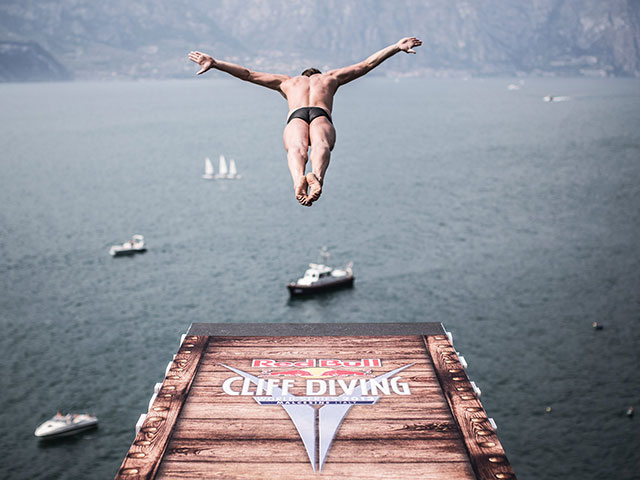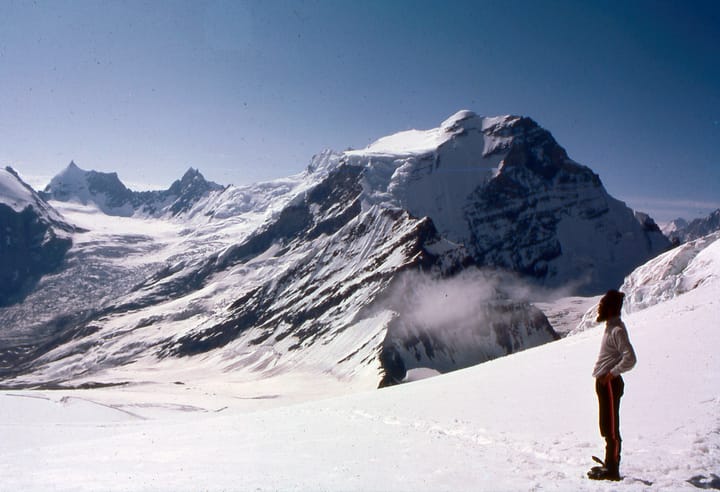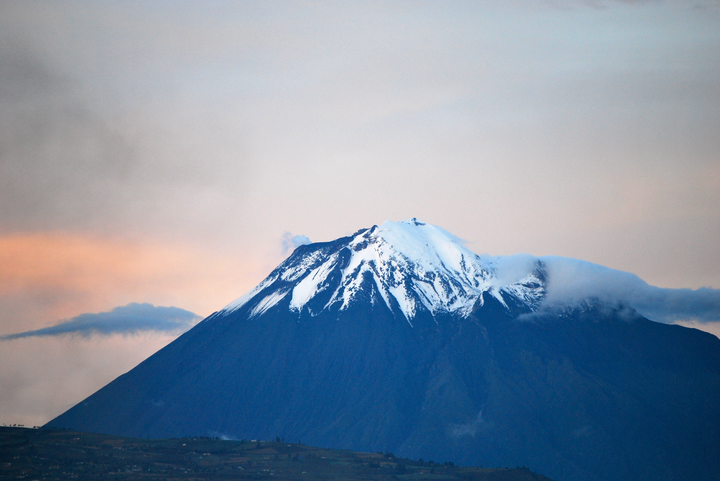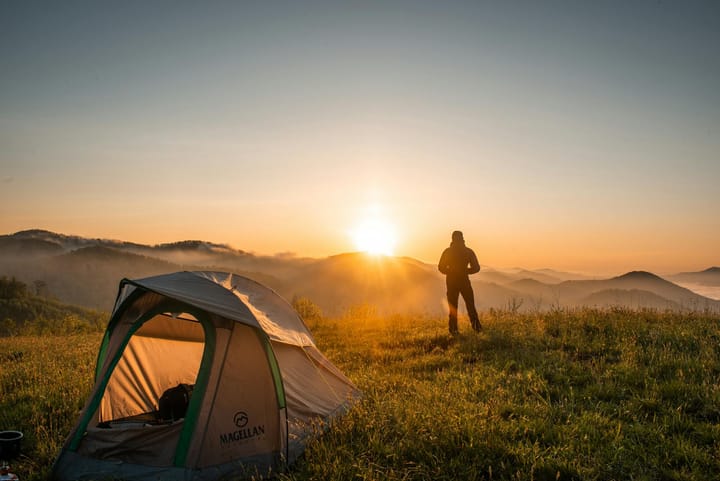Cliff diving crowns a new lord

David Colturi takes the first ever Red Bull Cliff Diving World Series victory in Malcesine, ItalyHe had a good start into the competition in July and performed his new dive – a triple triple – to take the lead in round three. American David Colturi won what was a closely fought competition on Italy’s Lake Garda on a hot Sunday afternoon, leaving more than 20,000 spectators over the whole weekend in awe. The Outdoor Journal interviewed Mr Colturi to find out the composition of a cliff diving champion.
Could you describe your inner feelings when you went in for that final (winning) dive? Where you frightened? Were you pumped and excited?
Standing on the platform before my final dive in Malcesine is something I will never forget. My best friend and teammate, Steven LoBue, had just hit his dive right before me, securing his spot atop the current standings. I was extremely happy for him, and excited for my chance to stand next to him on the podium; however, results were not at the forefront of my mind. I was definitely a little scared and nervous, the same amount before every cliff dive since it is such a hard sport. More than anything, I was immersed in this amazing moment and appreciating it for everything it was: an astounding atmosphere created by the combination of breathtakingly beautiful scenery, and 20,000 energetic Italians, one of the best crowds I've seen at a World Series event.
What is the basic difference between cliff diving and olympic pool diving, the scenery?
The main technical differences between Olympic springboard and platform diving, and cliff diving, are the height of takeoff and the type of entry. The Olympic events take place from the 3 meter springboard and 10 meter platform, and divers always enter the water hands first, tightly squeezed above their head. In contrast, cliff diving events are held from a platform around 27.5 meters above the water (slight differences in height are due to tidal changes and unique terrain challenges) and divers always enter the water feet first. The feet-first entry is necessary because the force of impact is so great from that high, a hands first entry would not be tolerated by the weaker upper body muscles, ligaments, tendons, and bones.
The scenery is an added bonus for us cliff divers, since there are no permanent 27 meter platforms around the world, Red Bull Cliff Diving World Series does an amazing job picking the most exotic, remote, and beautiful locations for us to compete.
Can you tell me about your fitness regime? What are the physical and mental exercises you follow? Any diet in particular? Why?
My fitness regiment is centered around strong lower body and core muscles, and it includes weight lifting, plyometrics, conditioning, cardio, and coordination exercises. Some of my favorite workouts involve using weights on a balance board. Mental training is just as, if not more important, than physical training, and these exercises include visualization, relaxation, and meditation. My diet isn't anything specific, I just try to keep it well balanced and nutritious.
A year after you were declared 'Rookie of the year', you won the Red Bull world diving series. What does this title mean to you? What's the next goal now that you won it all at 24?
Winning the Malcesine stop was a huge landmark for my cliff diving career. I joined an exclusive club with now only 5 people who have ever won a Red Bull Cliff Diving World Series event; however, I'm far from winning it all. Going into the 8th and final stop of this year's series I'm currently sitting in 5th place overall. I need to work on my consistency, and plan on learning some harder dives to get me on the podium more often. One of my many long term goals is to one day be the series champion.
Is risk part of what turns you on?
Risk and adrenaline rushes are an inherent part of diving, especially when it's from 27 meters. While those are elements that I've tended to gravitate toward throughout my life, I wouldn't say they are defining characteristics or the main focus of our sport. It's more about tactical, calculated aerial movements and conquering fear that make cliff diving so special.

What is the career span of a cliff diver like you?
Currently, I'm one of the youngest divers on the World Series, and altogether we range from 23-39. There have even been competitors in their mid 40's at some of the stops. Orlando Duque from Columbia is one of the most decorated cliff divers of all time, and being the oldest athlete on this year's tour he's currently in 2nd place overall. I'm not sure if I'll want to, or even be able to dive in my late 30's or into my 40's, but I'm certainly looking forward to a long career ahead of me.
Tell us about your new dive move, the triple triple. How, why and when did you came up with it? Honestly, I would throw up all over in the process if I dared...
The back triple somersaults with three twists (triple triple) is a dive I learned in Italy and competed 2 days later at the competition in Malcesine. It's a dive many of the other competitors use, and is actually one twist shy of Gary Hunt's back triple quad, one of the highest degree of difficulty dives ever done. I look at the triple triple as a lead up, or stepping stone to the triple quad, a dive I would like to compete next year. With the sport progressing so much over the last couple years it's not unreasonable to think even much harder dives are on the horizon.
What is your action plan / strategy to retain the title in 2014 given that other athletes like Steven LeBue and Gary Hunt will be hitting the diving board to topple you?
Once the series finally comes to a close in Thailand at the end of this month, my gameplan for 2014 is as follows: Firstly, fully recover and rehabilitate from my recent ankle injury. Secondly, go back to the basics and hit my entry drills hard in order to work on consistency. Finally, prepare for 3 new and extremely difficult dives that will put me in contention for the World Series title. Those dives will be the back triple quad, a backwards armstand with two and half somersaults and four twists, and a dive no one has ever done before- a reverse double quint (2 somersaults with 5 twists).
Which diving spot is the most challenging in this series and which is one spot in the world you would love to plunge into?
Even though we haven't competed yet, I think the upcoming finale in Thailand will be the most challenging location on this year's series. With an interesting twist to our usual format, the season ender is actually two competitions combined into one. There will be four different locations, two of which will be straight from the cliff with no platform, completing one of the goals of the series to get "back to the roots" of cliff diving. This is something I have very little experience with and it brings unique challenges like jumping from uneven terrain, and having to lean forward and jump out to clear the cliff's base below.
One of my dream locations is the recently discovered Son Doong Cave in Vietnam. Translating to Mountain River Cave, it is currently the largest known cave in the world and wasn't truly explored until 2009.
Image © Red Bull Content PoolPlace: Malcesine, Italy





Comments ()